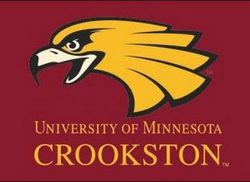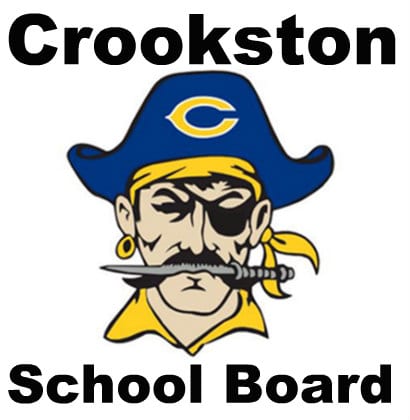The University of Minnesota Crookston announced this afternoon that they will cut the Golden Eagle Football program. Since joining the Northern Sun Intercollegiate Conference (NSIC) in 1999, UMC Football had 31 wins and 194 losses. In the last six seasons, UMC was 2-64.
The decision comes after the Northern Sun Conference presidents voted to establish a minimum number of sports to be a member of the Northern Sun Intercollegiate Conference (NSIC), but they no longer will make football mandatory. With the vote, it looks like UMC and St. Cloud State will be the first two NSIC schools to drop football, with one or more possibly following suit.
KROX met with the University of Minnesota Crookston Chancellor Mary Holz-Clause, Vice-Chancellor John Hoffman, and Athletic Director Stephanie Helgeson before the official announcement was made. Chancellor Holz-Clause said the decision wasn’t a sign that UMC is in financial trouble, it was the fact they didn’t think they were ever going to be able to compete with similar resources, facilities, coaching staff’s and everything else to run a successful football program.
They didn’t have an exact estimate of how much the program cost the University as it fluctuates. There are currently 69 players on the Golden Eagle Football roster, eight coaches and 24 scholarships.
The football players scholarships will continue to be honored until they graduate or leave UMC. Head Coach Mark Dufner, who also teaches math classes on campus, will stay on staff and continue teaching and will also do some academic advising.
The seven assistant coach contracts will not be renewed.
Chancellor Holz-Clause said they will reinvest money from the football program into more staffing, and scholarships for the other sports programs. When asked if other programs should be concerned about being cut she said since they won’t offer football anymore they will have to offer at least 11 sports.
The Chancellor added that the coaches and players received the news and were saddened, but showed great character and it shows what kind of people they are.
KROX’s Chris Fee reached out to Head Coach Mark Dufner and he responded to the email –
Chris;
Thank you for all of your support over the years: I truly appreciate it.
In regards to dropping the program, I have no comment.
Best wishes,
Mark
KROX’s Chris Fee interviewed UMC Chancellor Mary Holz-Clause about the decision. The interview is below –
OFFICIAL NSIC RELEASE
With the recent news regarding the elimination of sport program offerings at St. Cloud State University (SCSU) and the University of Minnesota Crookston (UMC), the NSIC is providing an update on how the changes impact the operations of the conference.
The 2019-24 NSIC Strategic Plan instituted the goal of addressing issues regarding conference membership, potential growth, and future stability. Following review and discussion, the NSIC Board of Directors instituted policy change that creates institutional autonomy on their sports offerings by adjusting the requirements of the conference membership to the only mandate a certain number of conference-sponsored sports rather than requiring specific athletic programs.
The goal of the NSIC is to provide a smooth transition as both SCSU and UMC remain vital members of our conference. For the student-athletes at SCSU and UMC whose programs (football) have been eliminated with an immediate effective date, we will be waiving the conference’s interconference transfer restrictions.
The development of a 2020 NSIC Football schedule with 14 sponsoring institutions is under development.
UMC OFFICIAL RELEASE
CROOKSTON, Minn. – The University of Minnesota Crookston today announced it will discontinue its football program. The recently completed 2019 season is the last as a varsity sport.
“As an institution, the decision to discontinue any program is extremely difficult,” says Mary Holz-Clause, chancellor at UMN Crookston. “Ensuring a balanced, financially stable profile across our athletics department demands careful analysis, planning, and thoughtful consideration, all of which played a role in making this challenging decision and will continue to play a role in how we approach this work every day. Going forward, we will invest more in other programs to support the diverse demands and interests of our students, taking into account facility needs, departmental balance, budget, and competitive opportunities.
“We deeply value the hard work of our student-athletes, coaches, athletic administration and everyone associated with this program. They dedicated themselves to representing our campus community in a positive way and I want to thank them for that,” noted the Chancellor.
The University will honor scholarships for any student-athlete who wishes to continue academically at UMN Crookston. “Assistance will be provided to students as they navigate their future collegiate career. Staff members from athletic compliance, financial aid, student life, and Center for Student Success are available to assist football student-athletes through this transition,” says John Hoffman, vice chancellor for academic and student affairs.
The program has historically faced serious challenges from lack of available funding, challenges that have grown in recent years. Without substantial and ongoing financial investment in facilities, student-athlete development, scholarships and staffing, the football program cannot be maintained, let alone improve competitively.
Lacking the ability to make these investments, either now or in the future, Crookston will reallocate football-related expenditures into other areas of its athletics department to enhance and strengthen its other 12 NCAA Division II athletic programs, 11 of which compete in the Northern Sun Intercollegiate Athletic Conference (NSIC). These resources will provide more flexibility in roster sizes, scholarship offerings and staffing across all Golden Eagle programs, while also creating new opportunities to invest in maintaining and improving athletic facilities.
“Discontinuing the football program was not an option we wanted to pursue, but as we worked through the process, it became evident that it was the right decision for the long-term health of our athletics department,” said Stephanie Helgeson, director of athletics. “This will move Golden Eagle Athletics into its strongest possible future, one in which we can better support all of our athletics programs and provide an outstanding collegiate experience to each of our student-athletes.”
Tags:



